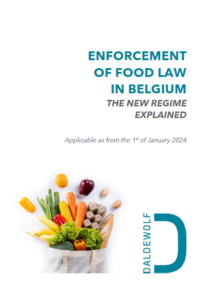Since January 1st, 2024, a stricter system of administrative sanctions has granted the Belgian Food Safety Agency (AFSCA/FAVV) increased coercive powers over food operators. This regulatory reform is enshrined in the new articles 7/1 to 7/5 of the Royal Decree of February 22, 2001, governing inspections carried out by the AFSCA/FAVV, as well as in the Royal Decree of August 30, 2023, defining the procedural rules and modalities for payment of administrative fines established by the Royal Decree of February 22, 2001.
 A new guide has been authored by Aude Mahy, a lawyer specializing in food law, to provide a comprehensive overview of this new legal framework, which represents a paradigm shift for many operators in the food industry in Belgium. The revised system of sanctions for violations of European and national food law has fundamentally reshaped the role of the AFSCA/FAVV and the powers it held until December 31, 2023.
A new guide has been authored by Aude Mahy, a lawyer specializing in food law, to provide a comprehensive overview of this new legal framework, which represents a paradigm shift for many operators in the food industry in Belgium. The revised system of sanctions for violations of European and national food law has fundamentally reshaped the role of the AFSCA/FAVV and the powers it held until December 31, 2023.
Previously, the AFSCA/FAVV essentially had a role in health policing. This role allowed it to investigate and identify violations of food regulations, in order to prevent dangerous or simply non-compliant foodstuffs from being placed on the market.
With the introduction of the new rules, the AFSCA/FAVV now also has sanctioning powers. It can impose administrative fines, the amounts of which are aligned with those of criminal fines, and enforce payment through attachment of operators’ assets and bank accounts. This marks a decisive turning point in the history of Belgian food law.